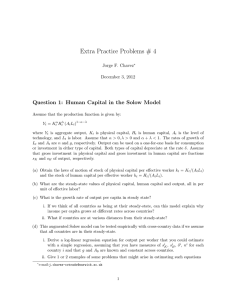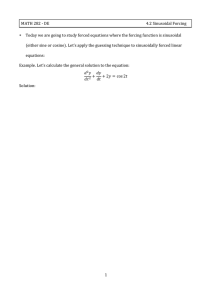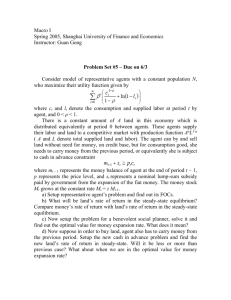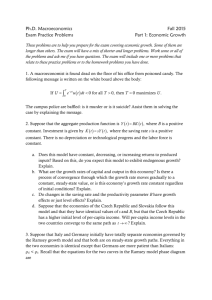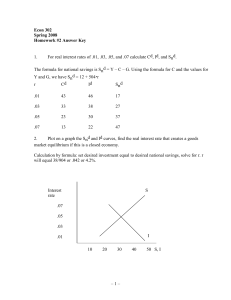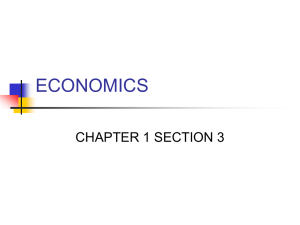THE STEADY-STATE ECONOMY: TOWARDS A POLITICAL
advertisement
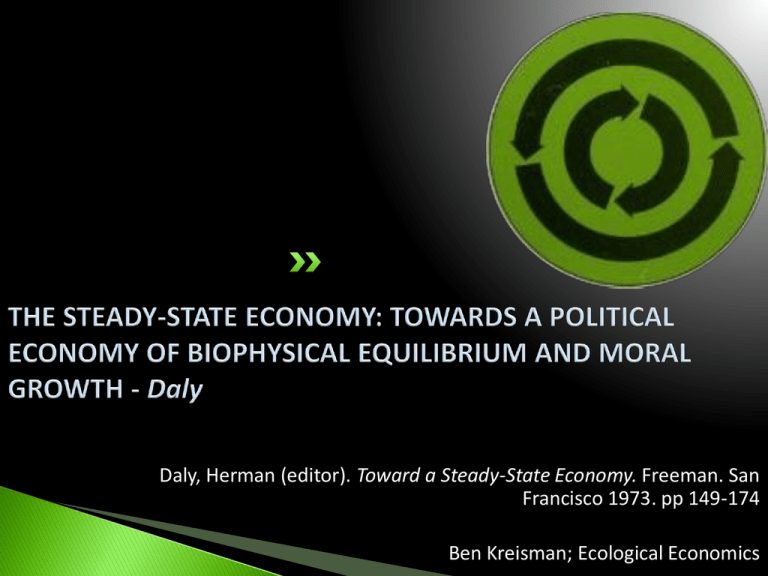
Daly, Herman (editor). Toward a Steady-State Economy. Freeman. San Francisco 1973. pp 149-174 Ben Kreisman; Ecological Economics Fragmentation of knowledge and people by excessive specialization Disequilibrium between the human economy and the natural ecosystem Congestion and pollution of our spatial dimension of existence Congestion and pollution of our temporal dimension of existence with the resulting state of harried drivenness poverty grow more to provide more employment for the poor unemployment invest and grow to bolster aggregate demand grow by raising productivity so more goods will be chased by the same number of dollars and prices will fall grow to become rich enough to afford the costs of cleaning up and of discovering new resources and technologies grow to be strong and have both guns and butter inflation pollution and depletion war “…defined as an economy which the total population and the total stock of physical wealth are maintained constant at some desired levels by a ‘minimal’ rate of maintenance throughput” 1. At what levels should the stocks of wealth and people be maintained constant? 1. What is the optimal level of maintenance throughput for a given level of stocks? 1. What is the optimal time horizon or accounting period over which population and wealth are required to be constant? 1. What is the optimal rate of transition from the growing economy to the steady-state economy? 1. 2. 3. maintaining constant populations maintaining constant stock of physical wealth governing distribution guiding design principle for social institutions provide the necessary control with a minimum sacrifice to personal freedom provide macrostability, allowing for microvariability combine macrostatic with microdynamic 1. maintaining constant populations 2. maintaining constant stock of physical wealth - - Kenneth Boulding plan for birth certificates - initial allocation is equal across the market compensation for people suffering from infertility rich can purchase more credits, but ultimately decrease per capita income - control aggregate depletion rather than control pollution legal rights to deplete auctioned off population /economic growth increase demand = higher prices and less consumption 3. governing distribution - - - Set limits for the maximum and minimum amount of wealth and income supports concept of property rights, but only under the assumption that everyone owns some property would legitimize free-market system Based on the assumption of static morality, logic and necessity are not sufficient to bring social change “…progress chiefly depends on the extent to which the strongest and not merely the highest forces of human nature can be utilized” – Alfred Marshall Sermon on the Mount: “Do not be anxious about tomorrow for tomorrow will be anxious for itself. Let the day’s own evil be sufficient for the day” Karl Marx’s materialism and objection to the alienation of man from nature; recognized that nature is the ‘inorganic body if man’ and not just a pile of neutral stuff to be dominated ‘wholeness’ If ‘truth’ is whole, then current knowledge is so far from the truth that knowledge is not worth obtaining “…unless physical, social and moral dimensions of our knowledge are integrated in a unified paradigm offering a vision of wholeness, no solutions to our problems are likely.” “…to advance the steady-state economy, with stabilized population and consumption, as a policy goal with widespread public support.” CASSE top 15 policies for achieving a steady-state economy Adopt macro-economic policy goal – a steady-state economy Maintain exemplary network of conservation areas sufficient in size to support ecosystem services Stabilize population Gradually reset existing fiscal, monetary and trade policy levers from growth towards steady-state Limit the range of inequality in income and wealth Develop a commons sector to accompany the public/private sectors; assign property rights for commonly held resources Employ cap-and-trade auctions in commons sector for allocating resources Establish for flexible working day/week/year Overhaul banking regulations; elimination of fractional reserve banking so monetary systems move away from debt structure that requires economic growth Adjust zoning policies to limit sprawl and promote energy conservation Continue to monitor GDP as a a measure of the size of the economy; use other measures for welfare Prevent unconstrained capital mobility Work towards full utilization of costs in prices Institute policies that move away from globalization and towards localization (conservation) Limit advertising to prevent unnecessary demand steadystate.org
